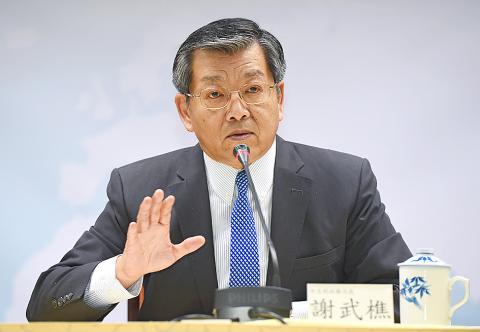If an agreement is reached between the Vatican and China, it would focus on religious affairs only and would not affect the Holy See’s ties with Taiwan, Deputy Minister of Foreign Affairs (MOFA) Kelly Hsieh (謝武樵) said yesterday.
Catholic and Chinese state media have reported that the Vatican and Beijing could seal a deal before the end of this month to end a decades-long dispute over the appointment of bishops in China, with some speculating that this could lead to the Vatican abandoning Taipei to form diplomatic ties with Beijing.
High-ranking Vatican officials have repeatedly told Taiwan that the agreement, once signed, would aim to handle Catholic religious affairs in China only and would not touch on political or diplomatic issues, Hsieh said, adding that talks on the subject between the Vatican and Beijing began as early as the 1990s.

Photo: Liu Hsin-de, Taipei Times
Only since Pope Francis assumed the papacy in March 2013 and began making goodwill gestures to China have breakthroughs been achieved, he said.
Even if the issue of bishop appointments is resolved, there are hundreds of other issues in China concerning religious freedom that need to be addressed by both sides, Hsieh said.
However, even with the Vatican’s reassurances, the ministry is closely monitoring talks between Beijing and the Holy See, as any deal would mark a new beginning for the two sides, Hsieh said.
Of its 17 diplomatic allies, the Holy See is Taiwan’s only one in Europe. Taiwan has lost five allies since President Tsai Ing-wen (蔡英文) took office in May 2016.
Catholics in China are divided into those belonging to so-called “underground churches,” which recognize the pope and the Holy See, and those belonging to the state-controlled Catholic Patriotic Association, the bishops of which are appointed by the Chinese government in collaboration with local parishes.
Under the anticipated deal, the Vatican would have a say in the appointment of future bishops, foreign media reports have said, bringing the two sides closer on a key issue that has divided them.

The Taipei City Government yesterday said contractors organizing its New Year’s Eve celebrations would be held responsible after a jumbo screen played a Beijing-ran television channel near the event’s end. An image showing China Central Television (CCTV) Channel 3 being displayed was posted on the social media platform Threads, sparking an outcry on the Internet over Beijing’s alleged political infiltration of the municipal government. A Taipei Department of Information and Tourism spokesman said event workers had made a “grave mistake” and that the Television Broadcasts Satellite (TVBS) group had the contract to operate the screens. The city would apply contractual penalties on TVBS

National Kaohsiung University of Science and Technology (NKUST) yesterday promised it would increase oversight of use of Chinese in course materials, following a social media outcry over instances of simplified Chinese characters being used, including in a final exam. People on Threads wrote that simplified Chinese characters were used on a final exam and in a textbook for a translation course at the university, while the business card of a professor bore the words: “Taiwan Province, China.” Photographs of the exam, the textbook and the business card were posted with the comments. NKUST said that other members of the faculty did not see

A new board game set against the backdrop of armed conflict around Taiwan is to be released next month, amid renewed threats from Beijing, inviting players to participate in an imaginary Chinese invasion 20 years from now. China has ramped up military activity close to Taiwan in the past few years, including massing naval forces around the nation. The game, titled 2045, tasks players with navigating the troubles of war using colorful action cards and role-playing as characters involved in operations 10 days before a fictional Chinese invasion of Taiwan. That includes members of the armed forces, Chinese sleeper agents and pro-China politicians

The lowest temperature in a low-lying area recorded early yesterday morning was in Miaoli County’s Gongguan Township (公館), at 6.8°C, due to a strong cold air mass and the effect of radiative cooling, the Central Weather Administration (CWA) said. In other areas, Chiayi’s East District (東區) recorded a low of 8.2°C and Yunlin County’s Huwei Township (虎尾) recorded 8.5°C, CWA data showed. The cold air mass was at its strongest from Saturday night to the early hours of yesterday. It brought temperatures down to 9°C to 11°C in areas across the nation and the outlying Kinmen and Lienchiang (Matsu) counties,